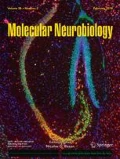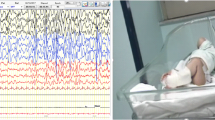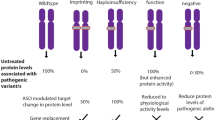Abstract
Febrile seizures (FS), the most frequent type of seizures in children, occur in neurologically normal infants and children between the ages of 3 months and 5 years with genetic predisposition. The aim of this study was to identify the responsible gene in a four-generation Chinese Han pedigree with autosomal dominant FS. Seven family members (three affected and four unaffected) were enrolled in this study. Exome sequencing was conducted and a duplication mutation c.649dupC (p.R217Pfs*8) in the proline-rich transmembrane protein 2 gene (PRRT2) was identified. The mutation co-segregated with the disorder and was absent in normal controls. To our knowledge, this is the first report of a pedigree with complete penetrance of FS, which is caused by mutation in the PRRT2 gene. FS is a novel phenotype of the c.649dupC (p.R217Pfs*8) mutation. Our discovery broadens the spectrum of genetic causes of FS and the spectrum of phenotypes linked to mutation in the PRRT2 gene.


Similar content being viewed by others
Abbreviations
- BFIS:
-
Benign familial infantile seizures
- CAE:
-
Childhood-absence epilepsy
- CPA6 :
-
The carboxypeptidase A6 gene
- EA:
-
Episodic ataxia
- EKD:
-
Episodic kinesigenic dyskinesia
- FS:
-
Febrile seizures
- GABRG2 :
-
The gamma-aminobutyric acid receptor gamma 2 gene
- GLUT1 :
-
The glucose transporter 1 gene
- GPR98 :
-
The G protein-coupled receptor 98 gene
- GTCS:
-
Generalized tonic-clonic seizures
- HCN2 :
-
The hyperpolarization-activated cyclic nucleotide-gated potassium channel 2 gene
- ICCA:
-
Infantile convulsions with paroxysmal choreoathetosis
- IMPA2 :
-
The myo-inositol monophosphatase 2 gene
- PED:
-
Paroxysmal exercise-induced dyskinesia
- PNKD:
-
Paroxysmal non-kinesigenic dyskinesia
- PRRT2 :
-
The proline-rich transmembrane protein 2 gene
- PT:
-
Paroxysmal torticollis
- SCN1A :
-
The sodium channel neuronal type I alpha subunit gene
- SEZ6 :
-
The seizures related gene 6 gene
- SNAP25:
-
Synaptosomal-associated protein 25-KD
References
Deprez L, Jansen A, De Jonghe P (2009) Genetics of epilepsy syndromes starting in the first year of life. Neurology 72:273–281
Hedera P, Ma S, Blair MA, Taylor KA, Hamati A, Bradford Y, Abou-Khalil B, Haines JL (2006) Identification of a novel locus for febrile seizures and epilepsy on chromosome 21q22. Epilepsia 47:1622–1628
Tsuboi T (1984) Epidemiology of febrile and afebrile convulsions in children in Japan. Neurology 34:175–181
Bird TD (1987) Genetic considerations in childhood epilepsy. Epilepsia 28(Suppl 1):S71–S81
Stanhope JM, Brody JA, Brink E (1972) Convulsions among the Chamorro people of Guam, Mariana Islands. I. Seizure disorders. Am J Epidemiol 95:292–298
(1989) Proposal for revised classification of epilepsies and epileptic syndromes. Commission on Classification and Terminology of the International League Against Epilepsy. Epilepsia 30: 389–399
Nabbout R, Prud’Homme JF, Herman A, Feingold J, Brice A, Dulac O, LeGuern E (2002) A locus for simple pure febrile seizures maps to chromosome 6q22-q24. Brain 125:2668–2680
Johnson EW, Dubovsky J, Rich SS, O’Donovan CA, Orr HT, Anderson VE, Gil-Nagel A, Ahmann P, Dokken CG, Schneider DT, Weber JL (1998) Evidence for a novel gene for familial febrile convulsions, FEB2, linked to chromosome 19p in an extended family from the Midwest. Hum Mol Genet 7:63–67
Yu ZL, Jiang JM, Wu DH, Xie HJ, Jiang JJ, Zhou L, Peng L, Bao GS (2007) Febrile seizures are associated with mutation of seizure-related (SEZ) 6, a brain-specific gene. J Neurosci Res 85:166–172
Mantegazza M, Gambardella A, Rusconi R, Schiavon E, Annesi F, Cassulini RR, Labate A, Carrideo S, Chifari R, Canevini MP, Canger R, Franceschetti S, Annesi G, Wanke E, Quattrone A (2005) Identification of an Nav1.1 sodium channel (SCN1A) loss-of-function mutation associated with familial simple febrile seizures. Proc Natl Acad Sci U S A 102:18177–18182
Nakayama J, Hamano K, Iwasaki N, Nakahara S, Horigome Y, Saitoh H, Aoki T, Maki T, Kikuchi M, Migita T, Ohto T, Yokouchi Y, Tanaka R, Hasegawa M, Matsui A, Hamaguchi H, Arinami T (2000) Significant evidence for linkage of febrile seizures to chromosome 5q14-q15. Hum Mol Genet 9:87–91
Nakayama J, Fu YH, Clark AM, Nakahara S, Hamano K, Iwasaki N, Matsui A, Arinami T, Ptacek LJ (2002) A nonsense mutation of the MASS1 gene in a family with febrile and afebrile seizures. Ann Neurol 52:654–657
Nakayama J, Yamamoto N, Hamano K, Iwasaki N, Ohta M, Nakahara S, Matsui A, Noguchi E, Arinami T (2004) Linkage and association of febrile seizures to the IMPA2 gene on human chromosome 18. Neurology 63:1803–1807
Wallace RH, Marini C, Petrou S, Harkin LA, Bowser DN, Panchal RG, Williams DA, Sutherland GR, Mulley JC, Scheffer IE, Berkovic SF (2001) Mutant GABA(A) receptor gamma2-subunit in childhood absence epilepsy and febrile seizures. Nat Genet 28:49–52
Salzmann A, Guipponi M, Lyons PJ, Fricker LD, Sapio M, Lambercy C, Buresi C, Ouled ABB, Lahjouji F, Ouazzani R, Crespel A, Chaigne D, Malafosse A (2012) Carboxypeptidase A6 gene (CPA6) mutations in a recessive familial form of febrile seizures and temporal lobe epilepsy and in sporadic temporal lobe epilepsy. Hum Mutat 33:124–135
Nakamura Y, Shi X, Numata T, Mori Y, Inoue R, Lossin C, Baram TZ, Hirose S (2013) Novel HCN2 mutation contributes to febrile seizures by shifting the channel’s kinetics in a temperature-dependent manner. PLoS One 8:e80376
Yuan L, Song Z, Xu H, Gu S, Zhu A, Gong L, Zhao Y, Deng H (2013) EIF4G1 Ala502Val and Arg1205His variants in Chinese patients with Parkinson disease. Neurosci Lett 543:69–71
Meneret A, Grabli D, Depienne C, Gaudebout C, Picard F, Durr A, Lagroua I, Bouteiller D, Mignot C, Doummar D, Anheim M, Tranchant C, Burbaud P, Jedynak CP, Gras D, Steschenko D, Devos D, Billette DVT, Vidailhet M, Brice A, Roze E (2012) PRRT2 mutations: a major cause of paroxysmal kinesigenic dyskinesia in the European population. Neurology 79:170–174
Heron SE, Grinton BE, Kivity S, Afawi Z, Zuberi SM, Hughes JN, Pridmore C, Hodgson BL, Iona X, Sadleir LG, Pelekanos J, Herlenius E, Goldberg-Stern H, Bassan H, Haan E, Korczyn AD, Gardner AE, Corbett MA, Gecz J, Thomas PQ, Mulley JC, Berkovic SF, Scheffer IE, Dibbens LM (2012) PRRT2 mutations cause benign familial infantile epilepsy and infantile convulsions with choreoathetosis syndrome. Am J Hum Genet 90:152–160
Chen WJ, Lin Y, Xiong ZQ, Wei W, Ni W, Tan GH, Guo SL, He J, Chen YF, Zhang QJ, Li HF, Lin Y, Murong SX, Xu J, Wang N, Wu ZY (2011) Exome sequencing identifies truncating mutations in PRRT2 that cause paroxysmal kinesigenic dyskinesia. Nat Genet 43:1252–1255
Lee HY, Huang Y, Bruneau N, Roll P, Roberson ED, Hermann M, Quinn E, Maas J, Edwards R, Ashizawa T, Baykan B, Bhatia K, Bressman S, Bruno MK, Brunt ER, Caraballo R, Echenne B, Fejerman N, Frucht S, Gurnett CA, Hirsch E, Houlden H, Jankovic J, Lee WL, Lynch DR, Mohamed S, Muller U, Nespeca MP, Renner D, Rochette J, Rudolf G, Saiki S, Soong BW, Swoboda KJ, Tucker S, Wood N, Hanna M, Bowcock A, Szepetowski P, Fu YH, Ptacek LJ (2012) Mutations in the novel protein PRRT2 cause paroxysmal kinesigenic dyskinesia with infantile convulsions. Cell Rep 1:2–12
Wang JL, Cao L, Li XH, Hu ZM, Li JD, Zhang JG, Liang Y, San-A LN, Chen SQ, Guo JF, Jiang H, Shen L, Zheng L, Mao X, Yan WQ, Zhou Y, Shi YT, Ai SX, Dai MZ, Zhang P, Xia K, Chen SD, Tang BS (2011) Identification of PRRT2 as the causative gene of paroxysmal kinesigenic dyskinesias. Brain 134:3493–3501
Schubert J, Paravidino R, Becker F, Berger A, Bebek N, Bianchi A, Brockmann K, Capovilla G, Dalla BB, Fukuyama Y, Hoffmann GF, Jurkat-Rott K, Anttonen AK, Kurlemann G, Lehesjoki AE, Lehmann-Horn F, Mastrangelo M, Mause U, Muller S, Neubauer B, Pust B, Rating D, Robbiano A, Ruf S, Schroeder C, Seidel A, Specchio N, Stephani U, Striano P, Teichler J, Turkdogan D, Vigevano F, Viri M, Bauer P, Zara F, Lerche H, Weber YG (2012) PRRT2 mutations are the major cause of benign familial infantile seizures. Hum Mutat 33:1439–1443
Guo XN, Lu Q, Zhou XQ, Liu Q, Zhang X, Cui LY (2014) Re-evaluation of PRRT2 mutations in paroxysmal disorders. J Neurol 261:951–953
Riant F, Roze E, Barbance C, Meneret A, Guyant-Marechal L, Lucas C, Sabouraud P, Trebuchon A, Depienne C, Tournier-Lasserve E (2012) PRRT2 mutations cause hemiplegic migraine. Neurology 79:2122–2124
Gardiner AR, Bhatia KP, Stamelou M, Dale RC, Kurian MA, Schneider SA, Wali GM, Counihan T, Schapira AH, Spacey SD, Valente EM, Silveira-Moriyama L, Teive HA, Raskin S, Sander JW, Lees A, Warner T, Kullmann DM, Wood NW, Hanna M, Houlden H (2012) PRRT2 gene mutations: from paroxysmal dyskinesia to episodic ataxia and hemiplegic migraine. Neurology 79:2115–2121
Marini C, Conti V, Mei D, Battaglia D, Lettori D, Losito E, Bruccini G, Tortorella G, Guerrini R (2012) PRRT2 mutations in familial infantile seizures, paroxysmal dyskinesia, and hemiplegic migraine. Neurology 79:2109–2114
Dale RC, Gardiner A, Antony J, Houlden H (2012) Familial PRRT2 mutation with heterogeneous paroxysmal disorders including paroxysmal torticollis and hemiplegic migraine. Dev Med Child Neurol 54:958–960
Liu Q, Qi Z, Wan XH, Li JY, Shi L, Lu Q, Zhou XQ, Qiao L, Wu LW, Liu XQ, Yang W, Liu Y, Cui LY, Zhang X (2012) Mutations in PRRT2 result in paroxysmal dyskinesias with marked variability in clinical expression. J Med Genet 49:79–82
Scheffer IE, Grinton BE, Heron SE, Kivity S, Afawi Z, Iona X, Goldberg-Stern H, Kinali M, Andrews I, Guerrini R, Marini C, Sadleir LG, Berkovic SF, Dibbens LM (2012) PRRT2 phenotypic spectrum includes sporadic and fever-related infantile seizures. Neurology 79:2104–2108
Brueckner F, Kohl B, Puest B, Gassner S, Osseforth J, Lindenau M, Stodieck S, Biskup S, Lohmann E (2014) Unusual variability of PRRT2 linked phenotypes within a family. Eur J Paediatr Neurol 18:540–542
Crompton DE, Berkovic SF (2009) The borderland of epilepsy: clinical and molecular features of phenomena that mimic epileptic seizures. Lancet Neurol 8:370–381
Suls A, Dedeken P, Goffin K, Van Esch H, Dupont P, Cassiman D, Kempfle J, Wuttke TV, Weber Y, Lerche H, Afawi Z, Vandenberghe W, Korczyn AD, Berkovic SF, Ekstein D, Kivity S, Ryvlin P, Claes LR, Deprez L, Maljevic S, Vargas A, Van Dyck T, Goossens D, Del-Favero J, Van Laere K, De Jonghe P, Van Paesschen W (2008) Paroxysmal exercise-induced dyskinesia and epilepsy is due to mutations in SLC2A1, encoding the glucose transporter GLUT1. Brain 131:1831–1844
Mullen SA, Suls A, De Jonghe P, Berkovic SF, Scheffer IE (2010) Absence epilepsies with widely variable onset are a key feature of familial GLUT1 deficiency. Neurology 75:432–440
Liu XR, Wu M, He N, Meng H, Wen L, Wang JL, Zhang MP, Li WB, Mao X, Qin JM, Li BM, Tang B, Deng YH, Shi YW, Su T, Yi YH, Tang BS, Liao WP (2013) Novel PRRT2 mutations in paroxysmal dyskinesia patients with variant inheritance and phenotypes. Genes Brain Behav 12:234–240
Li J, Zhu X, Wang X, Sun W, Feng B, Du T, Sun B, Niu F, Wei H, Wu X, Dong L, Li L, Cai X, Wang Y, Liu Y (2012) Targeted genomic sequencing identifies PRRT2 mutations as a cause of paroxysmal kinesigenic choreoathetosis. J Med Genet 49:76–78
Cloarec R, Bruneau N, Rudolf G, Massacrier A, Salmi M, Bataillard M, Boulay C, Caraballo R, Fejerman N, Genton P, Hirsch E, Hunter A, Lesca G, Motte J, Roubertie A, Sanlaville D, Wong SW, Fu YH, Rochette J, Ptacek LJ, Szepetowski P (2012) PRRT2 links infantile convulsions and paroxysmal dyskinesia with migraine. Neurology 79:2097–2103
Tan LC, Methawasin K, Teng EW, Ng AR, Seah SH, Au WL, Liu JJ, Foo JN, Zhao Y, Tan EK (2014) Clinico-genetic comparisons of paroxysmal kinesigenic dyskinesia patients with and without PRRT2 mutations. Eur J Neurol 21:674–678
Ono S, Yoshiura K, Kinoshita A, Kikuchi T, Nakane Y, Kato N, Sadamatsu M, Konishi T, Nagamitsu S, Matsuura M, Yasuda A, Komine M, Kanai K, Inoue T, Osamura T, Saito K, Hirose S, Koide H, Tomita H, Ozawa H, Niikawa N, Kurotaki N (2012) Mutations in PRRT2 responsible for paroxysmal kinesigenic dyskinesias also cause benign familial infantile convulsions. J Hum Genet 57:338–341
Sheerin UM, Stamelou M, Charlesworth G, Shiner T, Spacey S, Valente EM, Wood NW, Bhatia KP (2013) Migraine with aura as the predominant phenotype in a family with a PRRT2 mutation. J Neurol 260:656–660
Okumura A, Shimojima K, Kubota T, Abe S, Yamashita S, Imai K, Okanishi T, Enoki H, Fukasawa T, Tanabe T, Dibbens LM, Shimizu T, Yamamoto T (2013) PRRT2 mutation in Japanese children with benign infantile epilepsy. Brain Dev 35:641–646
Acknowledgments
This study was supported by grants 81101339 and 81271921 from National Natural Science Foundation of China, grant 20110162110026 from Research Foundation for the Doctoral Program of Higher Education of China, grant 2011ssxt194 from Graduate Degree Theses Innovation Foundation of Central South University, China.
Conflict of Interest
The authors declare that they have no conflict of interest.
Author information
Authors and Affiliations
Corresponding author
Rights and permissions
About this article
Cite this article
Zheng, W., Zhang, J., Deng, X. et al. Identification of a Premature Termination Mutation in the Proline-Rich Transmembrane Protein 2 Gene in a Chinese Family with Febrile Seizures. Mol Neurobiol 53, 835–841 (2016). https://doi.org/10.1007/s12035-014-9047-4
Received:
Accepted:
Published:
Issue Date:
DOI: https://doi.org/10.1007/s12035-014-9047-4




